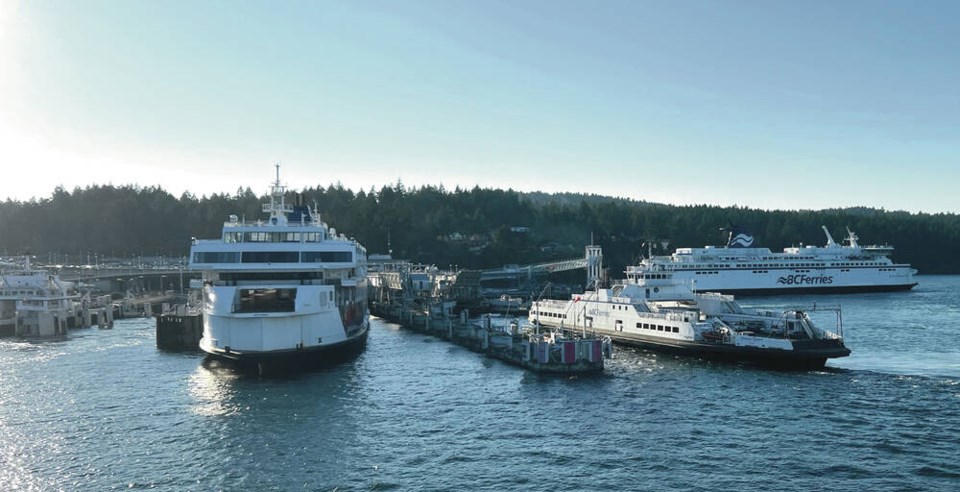B.C. Ferries advisory committee chairs were stunned to learn Monday that all 13 committees are being shut down at the end of April, to be replaced by a new engagement system that has not yet been designed.
As of January, B.C. Ferries will be working to design a “new engagement model that better addresses the evolving needs of growing coastal communities, reflecting the importance of more effectively incorporating digital engagement,” it said in a statement on Monday.
“I’m boggled,” said Diana Mumford, the chair of all the committee chairs, who also heads up the Southern Sunshine Coast f erry advisory committee.
B.C. Ferries officials informed advisory committee members in a conference call on Monday of its decision to dismantle committees.
“We are really upset,” Mumford said. “People were shocked.”
B.C. Ferries has not asked committees to help develop a better engagement process and did not ask for suggestions, Mumford said. “They put us on the back burner and they have been doing that for the last, I would say, year and a half to two years.”
Future engagement could include community forums, terminal and on-board pop-up feedback opportunities, interest-holder meetings and B.C. Ferries officials attending local events, the company said.
Feedback from local governments and residents indicated they wanted a more transparent, more collaborative approach with elected officials and to hear from more under-represented voices, said B.C. Ferries.
It says it will collaborate with ferry advisory committees, residents, customers, local governments and MLAs, First Nations, and other groups to design its new engagement model, which will replace the advisory committees and be in place in May 2025.
Volunteer committee members serve two-year terms that were set to expire at the end of this year. Those terms have now been extended to the end of April.
Mumford said the advisory committees, which have been representing coastal communities for 31 years, have a “fair amount of credibility,” and raise issues with B.C. Ferries including scheduling, traffic management, accessibility and on-time performance. “I’m not sure they can replicate that by starting over.”
In terms of representation, applications to join the committees are examined by committee chairs before being forwarded with recommendations to B.C. Ferries, which makes the final appointments, said Mumford, adding names are provided that are representative of a community.
Ian Cameron, chair of the Mill Bay ferry advisory committee, said committee members told B.C. Ferries in the meeting: “There’s all this experience and there are all these people who sit on the FACs and they know an awful lot about the community and they know an awful lot about the ferry and what are you going to do instead?
“Ferries didn’t really have much of an answer.”
Evan Putterill, chair of the North and Central Coast ferry advisory committee, said dismantling the committees is disappointing but not surprising. “B.C. Ferries has basically been not really engaging in the FAC process in a meaningful way for the last two and a half years.”
Instead, B.C. Ferries has been focused on codes of conduct and terms of reference for committees, he said.
“We’ve been working on anything except for operational issues and getting down to what matters in communities,” he said. “The FACs have been asking time and time again to get down to that and it’s just been stalling and stalling and stalling.”
In September 2023, B.C. Ferries moved its advisory committee meetings online and postponed drop-in sessions after a threat of violence at a Sunshine Coast ferry advisory committee meeting.
Jeff Groot, B.C. Ferries spokesperson, said the goal is to come up with a model that will lead to broader, representative feedback and include not just in-person meetings but more online options.
Expectations of communities have evolved in the past 30 years, Groot said. Currently elected representatives, such as mayors and heads of First Nations, are not built into the engagement process, which is something the company would like to see, he said.
B.C. Ferries is also looking at having clear processes for feedback so it can incorporate it into decisions and show residents they are getting a response, he said.
There is nothing precluding current ferry committee members from being involved in the future engagement system, Groot said.
>>> To comment on this article, write a letter to the editor: [email protected]




